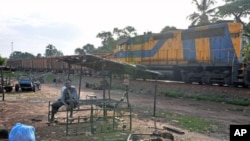Revenue Watch, a group that promotes management of oil and minerals for the public good, says Guinea's new mining code will help this mineral-rich country recover from decades of misrule.
After 50 years of dictatorial rule, the 10 million people of Guinea, West Africa's most mineral-rich country, have scarcely benefited from the trillions of dollars worth of precious elements buried beneath their feet.
A flurry of updated rules governing mining companies, passed on September 10 by Guinea's first democratically elected government, intends to correct that error.
New rules to share wealth
The new rules could more than double the share of mining revenue the Guinean government receives. For decades, Guinea has enjoyed just 15 percent of the profits made by mining companies - a standard, if arguably low, rate for African countries.
Under the new code, Guinea could receive as much as 35 percent of that revenue. The code also will force both mining companies and the state to undergo anti-corruption audits, and to publish their contracts online.
Those may seem like minor anti-corruption measures. But in Guinea, where more than 90 percent of their exports are dominated by mining shipments, the code is "a very good thing for the country," said Legal Advisor Patrick Heller for the Revenue Watch Institute.
"This is an extremely progressive code. It puts in place a lot of very strong requirements that bind not only the mining companies, but most notably that also bind the government to manage the sector in a credible, and a transparent, and in a systematic way," said Heller. "So from that perspective I think the code is a very significant step forward."
Inspiring change
Mining companies aren't so delighted by it. Rusal, the world's top maker of aluminum, called the new rules "senseless" in an email to Bloomberg News.
The Russian mining company wrote that "any investor of good sense will look for investment opportunities somewhere outside of Guinea."
The problem for companies like Rusal is that there aren't a lot of nations that have as much to offer as Guinea. The Britain-sized country contains half of all the earth's bauxite, a crucial ore that is ground down to make aluminum. Its ground also contains huge stocks of gold and diamonds.
More globally, Heller adds, Guinea's neighbors are likely to find inspiration in this new law. Nations across the world, especially in mineral-rich, but often cash-poor Africa, are being more assertive, he said. Companies, meanwhile, are listening.
"The world is moving in this direction. And we're seeing in a number of countries in various parts of the world an increased willingness and an increased recognition that it's important to operate and cooperate with national authorities in such a way that transparency is enhanced and the population has a sense that these resources are building toward the long-term development of the state, not just because it's the quote on quote 'right thing to do,' but it's good business. It renders these deals much more stable in the long run," he said.
Guinea held its first free elections late last year, bringing President Alpha Conde to power. The elections ended nearly two years of military rule, preceded by years of dictatorship under Lansana Conte.
Guinea Aims to Spread Wealth From Mining Resources
- By Drew Hinshaw




